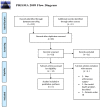The impact of mental health disorders on outcomes following hip arthroscopy for femoroacetabular impingement syndrome: a systematic review
- PMID: 33163204
- PMCID: PMC7605775
- DOI: 10.1093/jhps/hnaa016
The impact of mental health disorders on outcomes following hip arthroscopy for femoroacetabular impingement syndrome: a systematic review
Abstract
Hip arthroscopy for femoroacetabular impingement syndrome (FAI) has been shown to be beneficial in the short- to medium-term though outcomes vary between individuals. Multiple factors have been suggested to affect outcomes including pre-operative mental health disorders. We undertook a systematic review to assess the evidence relating to the effect of pre-existing mental health disorders on the outcomes following hip arthroscopy for FAI. Following PRISMA guidelines, a multi-database search was undertaken using three key concepts: 'mental health', 'FAI' and 'hip arthroscopy'. Results were screened and data extracted from relevant studies. A total of six studies met the inclusion criteria including 2248 hips, all published between 2017 and 2019. All studies were of evidence level III or IV with reasonable methodological quality. One study demonstrated pre-operative depression to be related to altered pain reduction in the short-term following surgery. Three studies reported inferior outcomes in the medium-term (1-2 years) in those with worse mental health. One study demonstrated an increased risk of persistent pain 2 years following surgery and one a reduced chance of returning to active military service following surgery in those with worse mental health. Despite inferior outcomes individuals with mental health disorders did still benefit from surgery in general. In conclusion, the presence of pre-existing poor mental health is associated with inferior outcomes in the medium-term following arthroscopic surgery for FAI. Surgeons should consider screening patients for mental health disorders before surgery and counselling them appropriately as to the potential for less satisfactory surgical outcomes.
© The Author(s) 2020. Published by Oxford University Press.
References
-
- Nakano N, Khanduja V. Femoroacetabular impingement: the past, current controversies and future perspectives. Phys Sportsmed 2018; 46: 270–2. - PubMed
-
- Ito K, Minka MA, Leunig M et al. Femoroacetabular impingement and the cam-effect. A MRI-based quantitative anatomical study of the femoral head-neck offset. J Bone Joint Surg 2001; 83-B: 171–6. - PubMed
-
- Dick AG, Houghton JM, Bankes M. An approach to hip pain in a young adult. BMJ 2018; 361: k1086. - PubMed
-
- Egger AC, Frangiamore S, Rosneck J. Femoroacetabular impingement: a Review. Sports Med Arthrosc 2016; 24:e53–8. - PubMed
Publication types
LinkOut - more resources
Full Text Sources
Miscellaneous


